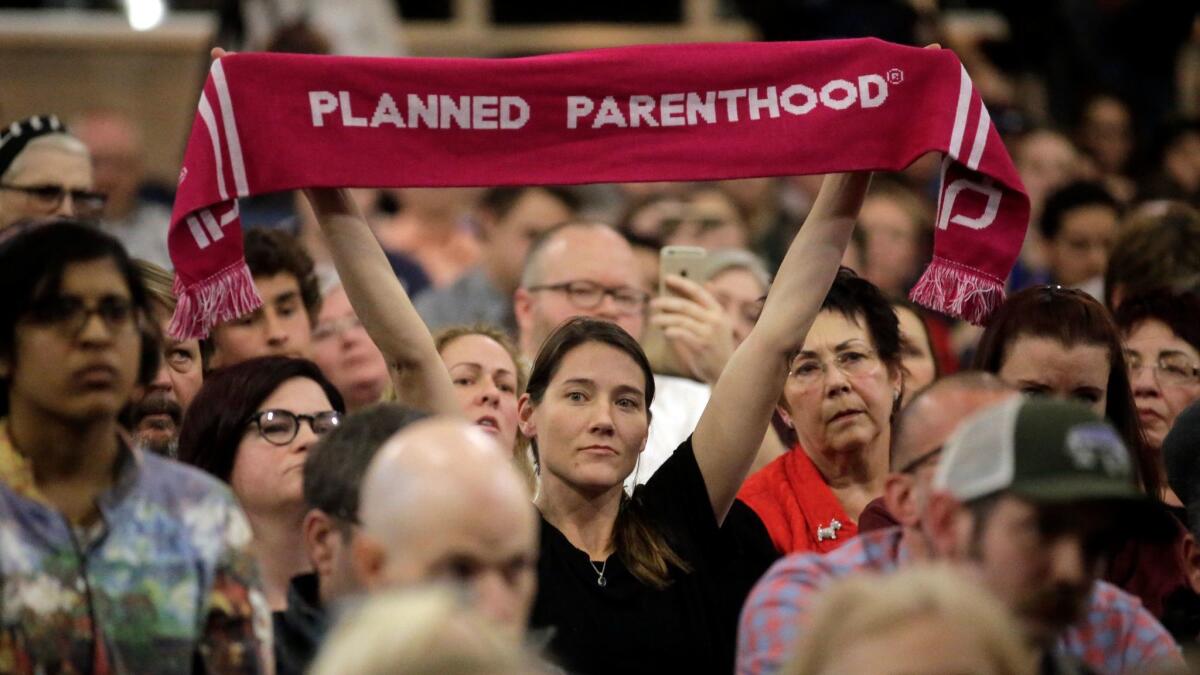Op-Ed: Why is Planned Parenthood popular? And if it’s defunded, could any other organization fill the gap?

Congressional Republicans, President Trump and Vice President Mike Pence are united in support of “defunding” Planned Parenthood. Indeed, a provision in the GOP’s American Health Care Act would end its eligibility as a Medicaid provider, meaning patients covered by the low-income insurance program could no longer choose Planned Parenthood clinics for care.
Generally, Medicaid-provider status is stripped for reasons such as fraudulent billing or failure to meet medical standards. But the root issue in Planned Parenthood’s case is, of course, abortion. Although U.S. law bans federal funding for the procedure, anti-abortion advocates say government indirectly supports the abortion business by helping the organization keep its doors open for other services.
Before unraveling Planned Parenthood, though, Republicans should look at why it’s so popular among Medicaid recipients — and whether any other organization is well-positioned to fill the gap.
Actually, “popular” is an understatement. A one-stop venue for contraception, gynecological care, pregnancy testing, prenatal care, cervical cancer screenings, STI testing and more, Planned Parenthood’s U.S. health centers serve more than 2.8 million patients annually, 79% of whom have incomes below 150% of the poverty line. And more than half of patients pay for their visits via Medicaid.
Although Republicans say there are plenty of places that could pick up Planned Parenthood’s slack, that’s simply not true.
Demographics go a ways to explain Planned Parenthood’s appeal: Medicaid patients include a large number of reproductive-age women. In 2015, 17% of American women ages 19 to 64 were insured by Medicaid. To be eligible, one must have an income below 138% of the federal poverty line and, in some states, meet other criteria such as being pregnant or being the mother of young children.
Although Republicans say there are plenty of places that could pick up Planned Parenthood’s slack, that’s simply not true. At least half of its 600-plus health centers operate in areas with a shortage of medical facilities, and many are in areas officially designated as medically underserved.
Finding an obstetrician or gynecologist on short notice is notoriously difficult. A 2016 analysis found that there are only about 46,000 OB-GYNs in the U.S. — about 29 for every 100,000 women — and the American Congress of Obstetricians and Gynecologists estimates a shortage of 6,000 to 8,000 OB-GYNs by 2020. This shortage is worse for those on Medicaid, as many private practitioners won’t accept them as patients. Community health centers are hardly a sufficient stopgap, since these facilities are already stretched thin in terms of patient capacity, and their staff may lack expertise in sexual and reproductive issues.
Meanwhile, most Planned Parenthood health centers offer drop-in or same-day appointments, are accessible by public transportation, and are open beyond typical business hours — all important to women with unpredictable or inflexible work schedules and sporadic access to childcare or a car.
Without Planned Parenthood, a not insignificant number of women could be left in the lurch. To the extent that this leads to more unintended pregnancies, untreated STIs and so forth, it would also lead to higher costs for publicly funded health programs. About 45% of all births in the U.S. are paid for by the Medicaid program, and the “additional births that would result from [barring Planned Parenthood as a Medicaid provider] would add to federal spending for Medicaid,” the Congressional Budget Office noted recently.
Even without this speculative financial disaster, it’s hard to see a benefit in going after Planned Parenthood — even from an anti-abortion or limited-government perspective. If, as Republicans insist, patients can seek all the same services elsewhere, Medicaid costs will remain unchanged. The move won’t necessarily affect Planned Parenthood’s ability to provide abortions, since it doesn’t rely on Medicaid reimbursements for this service. At the same time, less access to contraception and family-planning services could lead to greater demand to terminate pregnancies.
For the moment, then, the organization is a vital part of the family-planning ecosystem, and simply deleting it as an option would be both devastating to patients and counterproductive to opponents’ stated goals.
All that said, it’s not necessarily a good thing that low-income women depend so heavily on Planned Parenthood for such important care, and it might be possible to reduce this dependence.
If lawmakers cleared the regulatory way for telemedicine, they could give low-income women more options. The same goes for repealing scope-of-practice rules that require doctors to perform tasks easily handled by nurse practitioners, pharmacists or midwives. Local politicians could also rethink zoning, building or licensing requirements that make it difficult or impossible for new providers to open in medically underserved areas.
Helping bring more medical options to marginalized populations is a worthy goal for even the most ardent Planned Parenthood supporter.
Whether one’s underlying goal is ensuring access to vital reproductive and sexual healthcare, reducing women’s need for abortions, or reducing publicly funded healthcare expenditures, focusing on breaking down barriers to innovative, independent and cost-effective care in underserved areas will make a world more difference than micromanaging where poor women can get birth control pills.
Elizabeth Nolan Brown is an editor at Reason magazine (where she focuses on the intersection of government, gender and sexuality) and a former health and women’s issues writer at outlets such as AARP and Bustle.
Follow the Opinion section on Twitter @latimesopinion or Facebook
MORE FROM OPINION
Beyond the ‘puppet’ question, what is Trump’s game plan for Russia?
The most relevant dystopian novel for our time is not ‘1984’ — it’s ‘Lord of the Flies’
More to Read
A cure for the common opinion
Get thought-provoking perspectives with our weekly newsletter.
You may occasionally receive promotional content from the Los Angeles Times.










